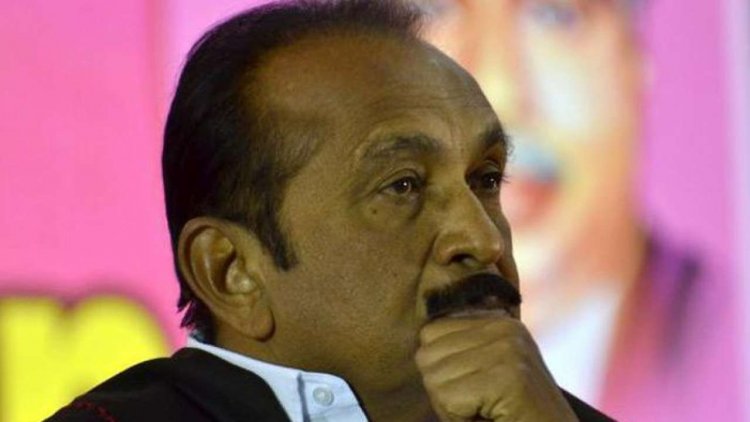MDMK chief Vaiko convicted in sedition case

Chennai: MDMK chief Vaiko, who is set to file his nomination for contesting the Rajya Sabha polls, was Friday convicted by a court here in a 2009 sedition case and sentenced to undergo simple imprisonment for a year.
Special Court for trial of MPs and MLAs Judge J Shanthi held Vaiko guilty of sedition as his speech came under the scope of creating disaffection against the government, which is covered in Section 124 A (sedition) of the Indian Penal Code (IPC).
Senior advocate P Wilson, quoting provisions, including the Representation of People Act, said there was no legal impediment to the MDMK general secretary contesting the Rajya Sabha polls.
Following a plea, the sentence was subsequently stayed for a month for letting him file an appeal against the order.
MDMK, an ally of the DMK, has been given one Rajya Sabha seat as part of a pre-poll arrangement for the Lok Sabha election.
According to the prosecution, Vaiko's speech on July 15, 2009, while releasing the Tamil version (Kutram Saaturgiren) of his English book "I accuse," on the Sri Lankan issue, was against the Indian government attracting the offence of sedition.
"I happily accept the one year imprisonment awarded by the court for speaking on the killings of Tamils in Sri Lanka and in support of the LTTE," Vaiko said in a release here on the judgment.
According to the MDMK chief, the book was a compilation of his letters to the then Prime Minister Manmohan Singh seeking redress for the Lankan issue.
He had also submitted a memorandum to Singh, in which he had alleged that lakhs of Tamils in Sri Lanka were killed by the Army there due to the arms and monetary support extended by India.
The compilation of letters in English was reproduced in his book released in 2009 following the Lankan civil war that year.
A sedition case was filed against him for his speech at the book launch event. He was acquitted in the case by another court previously.
However, another sedition case was filed against him for the speech he made at launch of the Tamil version of the book.
Vaiko's address in both the events broadly centred around his accusation that Indian government was responsible for the killings of the Tamil people in Lanka in the civil war of 2009 between the LTTE and Army.
In his speech, the MDMK chief also had expressed his readiness to lead young people from Tamil Nadu to Sri Lanka to fight for the cause of Tamils.
"Killing Tamils (in Sri Lanka) does not mean that there will be no one to question them (Lankan government). The youth (from Tamil Nadu) will be ready to struggle by carrying arms," he had said in the events, adding he will be leading such young men.
The special court judge said sedition included acts involving intention or tendency to create disorder or disturbance to law and order or incitement to violence and whoever tried to excite, attempts to excite came within the scope of Section 124 A.
"Whether that act resulted in violence is immaterial," the judge said in the judgment.
"In the result, the accused is found guilty under section 124 A of the IPC and convicted and sentenced to undergo imprisonment for a term of one year and also has to pay a fine of Rs 10,000," she ordered.
Default in remittance of fine would entail an additional one month simple imprisonment, the court said.
The court said the "hatred message," was delivered just two months after the death of LTTE leader V Prabhakaran in 2009.
Given this background, "at that time there was danger to the security of the State and Central (governments) and the mood of the people of the State was in a boiling situation."
"The position of the accused in the society and his speech made would have a tendency to create major impact on the mind of public and the consequential effect which the accused would surely be aware to be produced in the mind of the people."
Vaiko, who was present in the court, said he never sought any leniency in punishment.
He said he was prepared to accept the maximum punishment, even life imprisonment.
A petition was filed to suspend the sentence enabling an appeal against the order.
Subsequently, the sentence was stayed for one month and surety was also furnished by Vaiko in this regard.















































